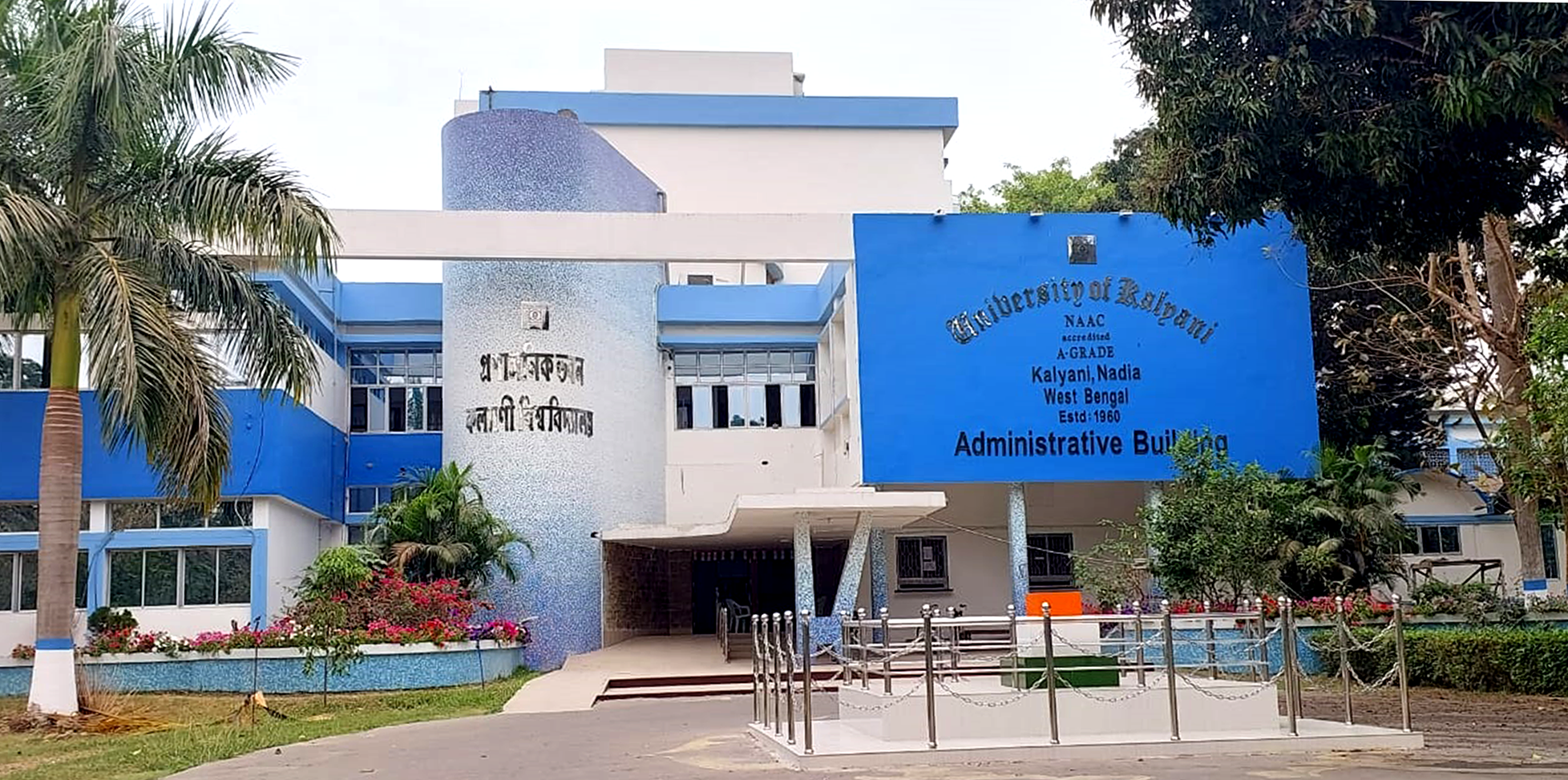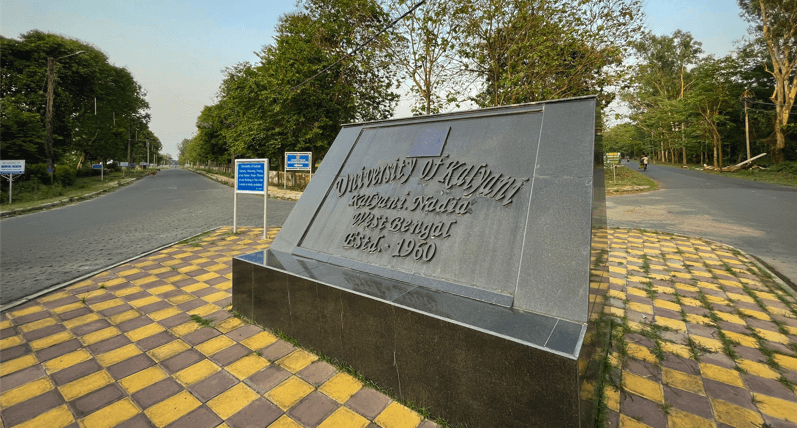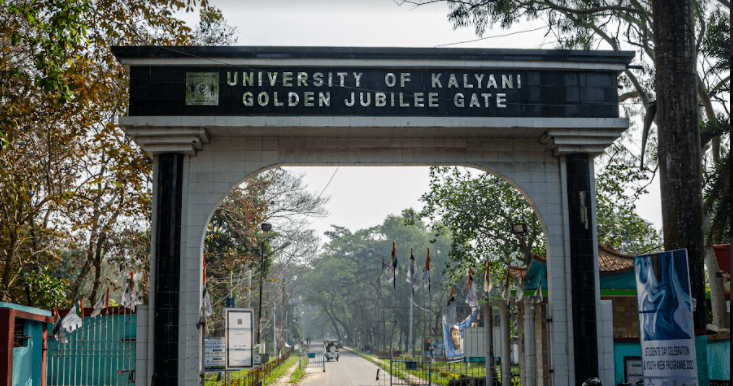
Kalyani as a satellite township under the long-term perspective plan of Calcutta Urban Agglomeration was the brainchild of our former Chief Minister Dr. Bidhan Chandra Roy. A Master Plan designed for the development of this township emphasized the need for education and health infrastructures. The University of Kalyani was established in 1960 with the objective of fulfilling one aspect of this need. Initially a unitary university with the faculties of Arts, Science, Education, and Agriculture, it has grown to have 62 affiliated colleges under its aegis in the districts of Nadia and Murshidabad. Since its inception, the University has attracted students of the region and beyond, as can be seen in the glorious alumni list of the University, comprising of eminent scientists, scholars, artists, sportspersons, and people’s representatives. In its early stage of growth, the University was bifurcated in the year 1975, with the Faculty of Agriculture turning into an independent Agricultural University, the Bidhan Chandra Krishi Viswavidyalaya in Mohanpur, Nadia. Post bifurcation, the University of Kalyani continued with the initially introduced teaching departments namely Botany, Chemistry, Mathematics, Physics, and Zoology under the Faculty of Science, and the departments of Education, Economics, Physical Education, and Sociology under the Faculty of Arts and Commerce. By the end of the 70s, the University had introduced four more departments, namely Bengali, History, Political Science, and Commerce under the Faculty of Arts, which was subsequently named the Faculty of Arts and Commerce, and Statistics under the Faculty of Science. The 80s saw the coming into effect of The Kalyani University Act, 1981, but the University had kept growing with and without it.

During the early 80s, the Department of Biophysics and Biochemistry under the Faculty of Science was opened and the Department of Modern Languages under the Faculty of Arts and Commerce started offering a Certificate Course in the Russian Language. The 90s witnessed the University offering interdisciplinary subjects with the introduction of the Departments of Folklore and Library and Information Science under the Faculty of Arts & Commerce and the Department of Environmental Science under the Faculty of Science. The University Science Instrumentation Centre was also established during this period with a number of undergraduate courses of B.Tech. being offered. Till 1998 the University continued functioning as a unitary university offering undergraduate courses. During 1998, it gained the status of an affiliating university with its territorial jurisdiction extended to the districts of Nadia and Murshidabad. In the initial stage, 37 colleges of these two districts which were affiliated with the University of Calcutta got their affiliation under the University of Kalyani. Since then, the University discontinued its undergraduate teaching programmes and left them to its affiliated colleges. During the first decade of the present century, the University introduced the Faculty of Engineering, Technology and Management with 3 new departments – Business Administration, Computer Science & Engineering, and Rural Development & Management. It also introduced 4 new departments under the Faculty of Science – Geography, Microbiology, Molecular Biology & Bio-Technology, and Physiology and Visual Arts under the Faculty of Arts and Commerce. During this period the University also introduced 3 new courses under existing departments, Integrated Statistics, M.Ed., and PG Diploma in Russian language. The University initiated its Department of Open and Distance Learning offering 4 PG courses – Bengali, Education, English, and History.

During the last ten years, the University has established the School of Interdisciplinary Studies with 3 new departments – Data Science, Genome Science and Nano Science. It also introduced the department of Food & Nutrition under the Faculty of Science, and departments of Hindi, Sanskrit, and Philosophy under the Faculty of Arts and Commerce. 2 existing centres got upgraded to Departments namely the Department of Engineering and Technological Studies, and Life-Long Learning & Extension and an existing course was reintroduced under the Department of Ecological Studies. The Department of Open and Distance Learning started offering 4 PG courses under the science stream – Botany, Geography, Mathematics and Zoology. A new UG course on Vocational Studies B.Voc. was also initiated. Research centres such as ENVIS, Centre for Bengali Diaspora, Centre for Woman Studies, Rabindra Adhyan Centre, and Centre for Cultural Studies were established. Besides the teaching and research departments, the University has also affiliated with several institutes which are providing extension-related services through several certificate courses and diplomas. With the establishment of an Entrepreneurship Hub within the campus in planning, the University has introduced 43 Certificate Courses aiming at entrepreneurship development under the aegis of the RUSA grant received by the University.
1960
The University of Kalyani was established with the Faculties of Arts, Science, Education, and Agriculture initially with 12 departments including Botany, Chemistry, Economics, Education, Mathematics, Physical Education, Physics, Sociology, Zoology, under the Faculties of Arts, Science, and Education and the others under Faculty of Agriculture
1970
The University bifurcated into two Universities with the Faculty of Agriculture taking on an independent identity of Bidhan Chandra Krishi Viswavidyalaya introduced four more departments, namely Bengali, History, Political Science, and Commerce under the Faculty of Arts, which was subsequently named the Faculty of Arts and Commerce, and Statistics under the Faculty of Science
1980
The Kalyani University Act, 1981 came into force and the University opened one department under the Faculty of Science namely, Biophysics and Biochemistry, and a Certificate Course under the Department of Modern Languages in the Russian language under the Faculty of Arts and Commerce
1990
The University decides to open its doors to interdisciplinary subjects and introduced the Departments of Folklore and Library and Information Science under the Faculty of Arts & Commerce and the Department of Environmental Science under the Faculty of Science. It also established the University Science Instrumentation Centre where a few undergraduate courses under the broad group of B.Tech. were introduced.
2000
The University introduced the Faculty of Engineering, Technology, and Management with 3 new departments - Business Administration, Computer Science & Engineering, and Rural Development & Management. It also introduced 4 new departments under the Faculty of Science-Geography, Microbiology, Molecular Biology & Bio-Technology, and Physiology and Visual Arts under the Faculty of Arts and Commerce. During this period the University also introduced 3 new courses under existing departments, Integrated Statistics, M.Ed., and PGDiplomain Russian language. The University initiated its Department of Open and Distance Learning offering 4 PG courses – Bengali, Education, English and History.
2010
University established the School of Interdisciplinary Studies with a new department –Data Science. It also introduced the department of Food & Nutrition under the Faculty of Science, and departments of Hindi, Sanskrit, and Philosophy under the Faculty of Arts and Commerce. 2 existing centers got upgraded to Departments namely Department of Engineering and Technological Studies, and Life Long Learning & Extension and an existing course was reintroduced under the Department of Ecological Studies. The Department of Open and Distance Learning started offering 4 PG courses under science stream – Botany, Geography, Mathematics and Zoology. A new UG course on Vocational Studies B.Voc. was also initiated.

